We all know organisations depend on stakeholders. They are integral to projects and their success. But, what do you do when you’re met with complaints, pushbacks, and negative interactions? Dealing with difficult stakeholders can be a huge load, so here are 5 strategies to help support you in these interactions.
Why are Stakeholders Important?
Organisations depend on stakeholders as they are integral to projects and their success. Whether they are your biggest advocates or your persistent NIMBYs, it is near impossible to undertake any project without having stakeholders involved. Especially when they all have very different levels of impact or influence.
You see, by involving stakeholders, organisations can receive various benefits, including valuable resources, materials, and knowledge, to help contribute to the overall success of upcoming projects. However, whilst some stakeholders may be cooperative and easy to deal with, others can be difficult and challenging.
What is Stakeholder Management?
Stakeholder management is the process of improving the relationship between an organisation and its stakeholders by aligning their shared values when providing solutions during decision-making. Businesses can do this by evaluating who their stakeholders are, monitoring their interactions, and analysing their needs.
Many organisations start managing their stakeholder interactions through their inbox or spreadsheets. Eventually, a more robust, flexible, and secure stakeholder engagement solution is needed as their stakeholder network grows and becomes more complex.
A Stakeholder Relationship Management (SRM) platform is built to optimise and enhance your processes so you can remain proactive in identifying arising issues and pinpointing stakeholders that could become difficult.
Reasons Stakeholders May be Difficult
Before we understand how we can actively manage difficult stakeholders, it is essential that we understand the reasons why we might be running into these issues initially.
Poor Communication
Misunderstandings and arguments can arise if an organisation fails to communicate effectively with stakeholders. This can result in tense relationships forming over the course of your project lifecycle.
If a stakeholder’s needs are not acknowledged or addressed, stakeholders may begin to feel undervalued or ignored. This can cause serious consequences, such as project delays, revenue loss, and damage to an organisation’s reputation. The result? Having to manage increased difficult stakeholders over time.
High Expectations
Stakeholders with high expectations can present problems for firms since they frequently have particular, specialized requirements. They often expect organisations to meet or exceed them, which can be difficult if they are attainable and scheduled to be completed in an unrealistic amount of time. While having high expectations can be a positive force for driving excellence, it can also create significant problems for organisations.
Being heavily focused on meeting these expectations can require significant resources, time, and effort. Organisations must be careful to manage stakeholders effectively to ensure they do not divert their attention away from other vital tasks or neglect the needs of other major stakeholders. Understanding your stakeholder’s needs and expectations can prevent costly obstacles and also aid in gaining more support.
Lack of Trust
Stakeholders can lose organisational trust, especially if their concerns or feedback are not taken seriously. One common cause is a lack of transparency when an organisation doesn’t communicate openly or honestly with their stakeholders. This can cause a sense of mistrust and suspicion, which can undermine the relationship between the organisation and stakeholders.
Losing trust can also occur when an organisation consistently fails to meet expectations and fulfill promises. When an organisation and its stakeholders do not trust each other, this can cause a lack of faith and confidence in an organisation to carry out tasks, significantly harming a business’s success and reputation.
Effectively building trust with difficult stakeholders is essential. So if you’re able to better connect with your stakeholders by understanding and responding to their key issues, you’ll be off to a good start.
5 Ways to Improve Relationships with Difficult Stakeholders
Whilst dealing with difficult stakeholders can be challenging, understanding how you can improve relationships, build a greater foundation of trust, and enhance your communication is integral.
Here are five ways to help you improve relationships with your stakeholders:
- Identify the stakeholder’s concerns
- Communicate regularly and effectively
- Involve them in the decision-making process
- Address their concerns
- Build a positive relationship
1. Identify the Stakeholder’s Concerns
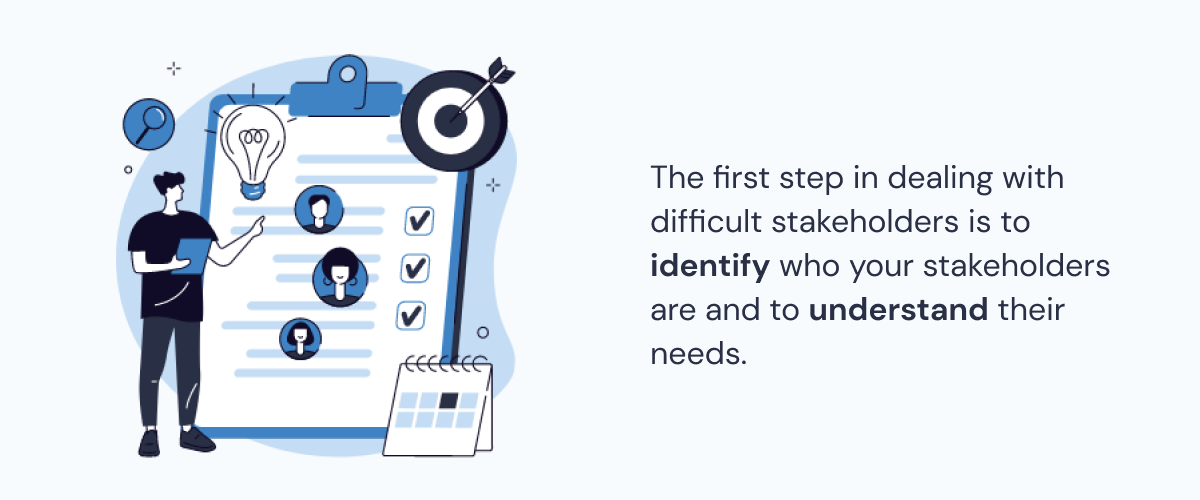
The first step in dealing with difficult stakeholders is identifying who they are and discovering their needs, expectations, and priorities. Identifying stakeholders’ concerns is critical as it can help organisations meet these needs and expectations while achieving project goals.
An SRM can ensure you remain proactive in identifying risks and issues as they arise over time. Consultation Manager has a built-in ‘Issues Over Time’ report to instantly identify and pinpoint where you may need to refocus attention, or why difficult stakeholders might be increasing.
2. Communicate Regularly and Effectively
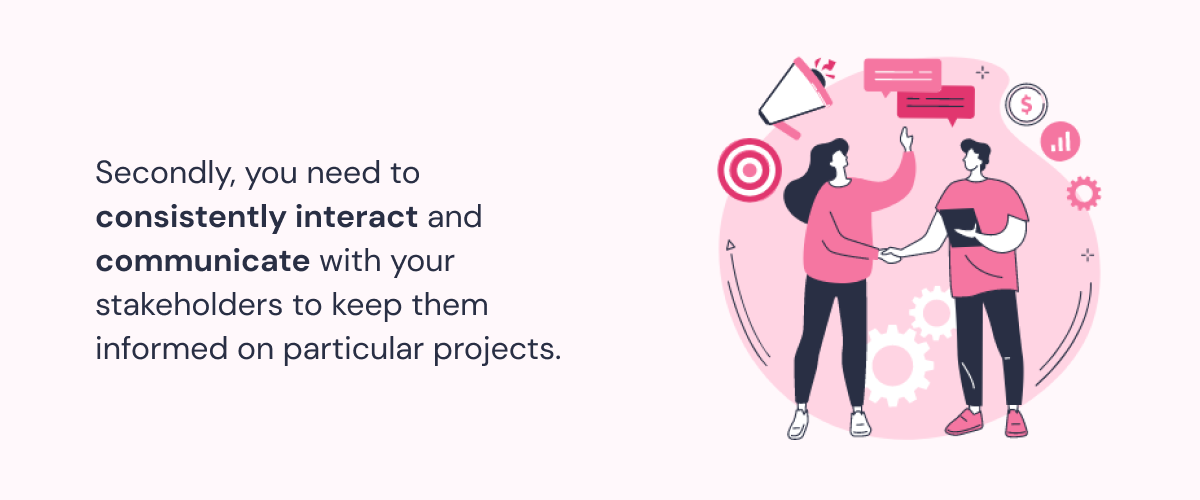
It is crucial for organisations to consistently interact with their stakeholders to keep them informed on particular projects. Stakeholders can feel more confident when an organisation is being honest and transparent about a project’s progress, timelines, and possible issues that arise. In addition, you can alleviate the concerns of difficult stakeholders by responding and acting quickly in a timely manner.
Organisations should actively listen to their stakeholders’ concerns and acknowledge their shared values. Giving difficult stakeholders a voice can also help them feel respected by having their shared values heard and making their opinions matter. Due to this deliberative engagement, you can produce tailor-made solutions that are explicitly created for your stakeholders. In addition, the more informed a stakeholder is, the more likely they will begin to trust an organisation.
A company can promote a more collaborative and supportive environment by maintaining open and transparent communication channels with stakeholders. An SRM is an effective tool to help deliver targeted communications to stakeholders of interest when required via branded emails, newsletters, or even SMS.
3. Involve Them in the Decision-Making Process
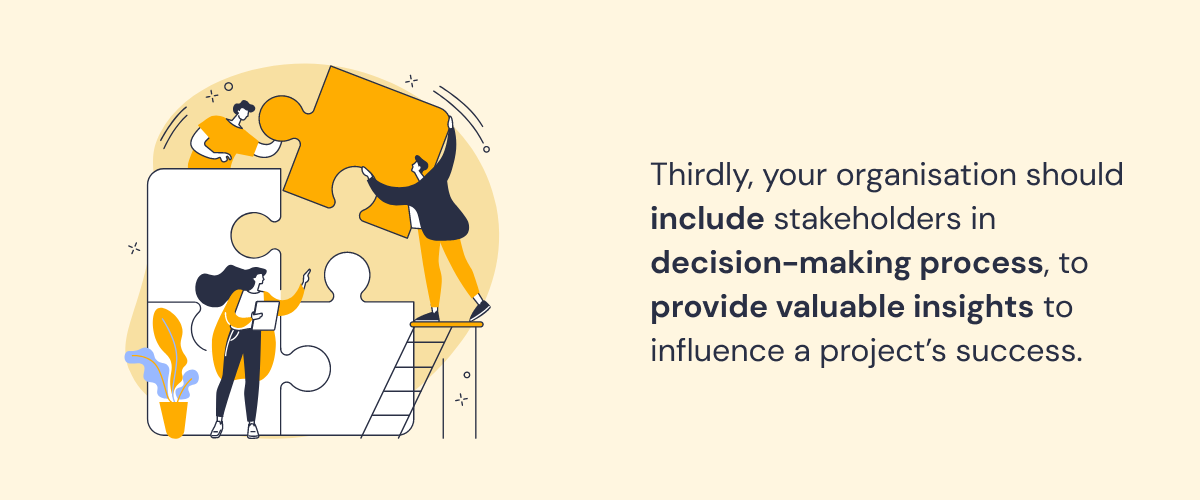
Organisations should include stakeholders in decision-making processes because it can benefit the project significantly, as they can help provide valuable insights to influence a project’s success. In addition, when difficult stakeholders participate in decision-making, they are more likely to feel ownership and investment, making them more committed to a project.
Furthermore, your difficult stakeholders may have unique knowledge or expertise that can aid in shaping the project’s direction, improving its quality, or mitigating risks. Involving stakeholders in decision-making can also assist organisations in receiving constructive feedback and developing stronger relationships with their stakeholders, increasing trust, loyalty, and support.
Many communication professionals are turning to community engagement platforms to provide a space for stakeholders to interact and contribute additional feedback. Community engagement platforms, such as Social Pinpoint, allow stakeholders to engage and interact in a safe, moderated environment, whilst actively keeping conversations open and flowing with regular updates available.
4. Address Their Concerns
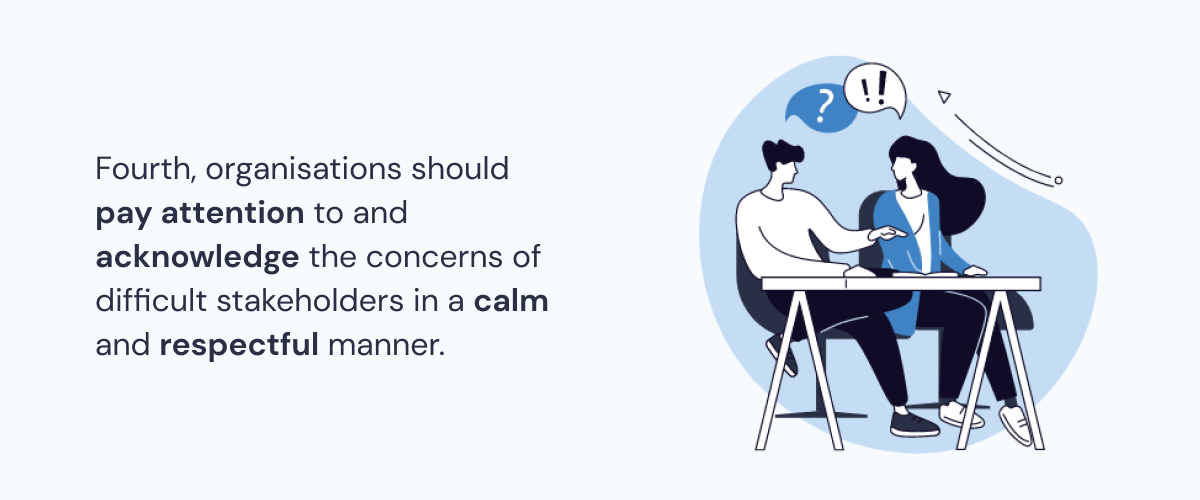
Organisations should pay attention to and acknowledge the concerns of difficult stakeholders. If their problems are based on incorrect or incomplete information, or if their proposed actions negatively impact the project or other stakeholders, it may be necessary to politely disagree and attempt to help them understand the organisation’s perspective.
It’s essential to remain calm in certain situations and not become aggressive or defensive in deliberative engagements. Whilst disagreements are natural, organisations must listen to their concerns, stay assertive, and provide solutions.
Remaining professional within an organisation will help a business make a good impression, have a long-lasting reputation, and build successful interpersonal relationships.
5. Build a Positive Relationship
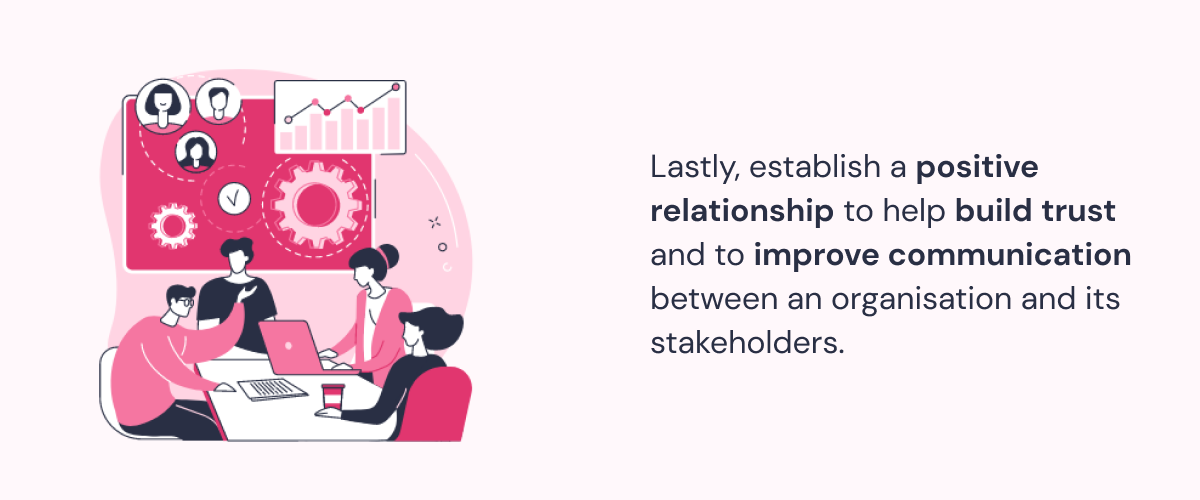
Establishing positive relationships with all stakeholders is essential for a project’s success – no matter how difficult they might be. A positive relationship with difficult stakeholders can bring several benefits, including enhancing an organisation’s reputation, and building a new foundation of reliability and respect.
Once an organisation actively listens to their concerns and stakeholders feel valued and appreciated, they will more likely support the organisation and its projects. This can lead to increased opportunities for growth and expansion and minimise project delays and intervention.
A positive relationship can also help build trust and improve communication between an organisation and its stakeholders. When stakeholders clearly understand what the organisation is trying to achieve, they are more likely to offer support and contribute their expertise and resources more effectively. And, hopefully, become a little less difficult (fingers crossed).
Managing difficult stakeholders can be strenuous, but we all know it is absolutely crucial for effective stakeholder management. By adopting effective strategies, such as active listening, compromising, and clear communication, organisations can build positive relationships with stakeholders to improve project outcomes and opportunities for growth and success.

